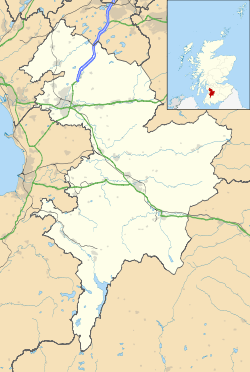Moscow, East Ayrshire
Coordinates: 55°37′59″N 4°24′14″W / 55.633°N 4.404°W
Moscow is a hamlet in East Ayrshire in Scotland. It is on the A719 road some 4 miles (6 kilometres) east of Kilmarnock. The name is thought to be a corruption of 'Moss-hall' or 'Moss-haw' but its spelling was formalised in 1812 to mark Napoleon's retreat from Moscow. A stream called the Volga Burn flows through the village. Locally the land and forest around Cowans Law to the north-west is referred to as 'Little Russia'. The hamlet also shares the same latitude (55° North) as the Russian city.
In 2006 its population was reported as 118. It is represented in the "Galston West and Hurlford North" ward of East Ayrshire Council.
History
Walter Emery of the Kilmarnock Glenfield Ramblers had researched the names Moscow, Volga and Ruschaw in 1933. The Ordnance Survey (OS) notified him that the local residents had authorised the name 'Moscow' and that the name appears on Aitken's 1829 map, the valuation role, the Grougar Estate map, and Johnson's 1828 County map. The Ordnance Survey also referred to a local tradition that the name was derived from the burning of Moscow in Russia in 1812, the first house in Moscow in Ayrshire having been built at about that time. Ayr County Council suggested that "during the Crimean war there were various refugees and prisoners located in the neighbourhood, and it was then that Russian names were given to various places."[1]
Shaw records that "a generation ago Russian prisoners of war were located between Galston and Fenwick, at a place called Moscow".[2]
In the Spring of 1884 a Mr. Rankin was found murdered in a gruesome fashion at his lonely cottage near Moscow. He was said to be well-to-do, however although no clues were found, theft was considered to be the motive; the guilty party was never brought to book. Mr. McNabb, a retired police officer, related that in his opinion the murder was carried out by a somnambulist who was therefore unaware of the deed. He had never ventured this opinion officially for fear of being laughed out of the force.[3]
Micro-history
In the 1980s it was reported a delegation of Russian dignitaries stopped in the village to see the other "Moscow".
Recently (2008) a personal airstrip was established in a field near the village for light aircraft.
A Geocache is located near the village, just up the road from the Community Woodland.
The village is referenced in the song "Hayfever" by The Trash Can Sinatras on their album "I've Seen Everything": "Moscow's in Ayrshire, what's the problem?"[4]
See also
- River Irvine - tributaries listed.
References
- Notes
- ↑ Emery, Page 169.
- ↑ Shaw, Page 166
- ↑ Aitken, Pages 43-46
- ↑ Trashcan Sinatras website, lyrics page| http://trashcansinatras.com/lyrics/ive-seen-everything-lyrics/
- Sources
- Aitken, John. The Humours of Ayrshire or Travels with a Bookstall. Kilmarnock : D. Brown & Co.
- Emery, Walter (1933), Armsheugh Glen and Templetonburn, 19 August 1933. Annals of the Kilmarnock Glenfield Ramblers Society. Jubilee Number. 1934.
- Shaw, James Edward (1953). Ayrshire 1745-1950. A Social and Industrial History. Edinburgh : Oliver & Boyd.
External links
| Wikimedia Commons has media related to Moscow, East Ayrshire. |
- Local government website
- Map sources for Moscow, East Ayrshire

